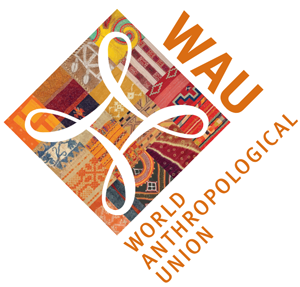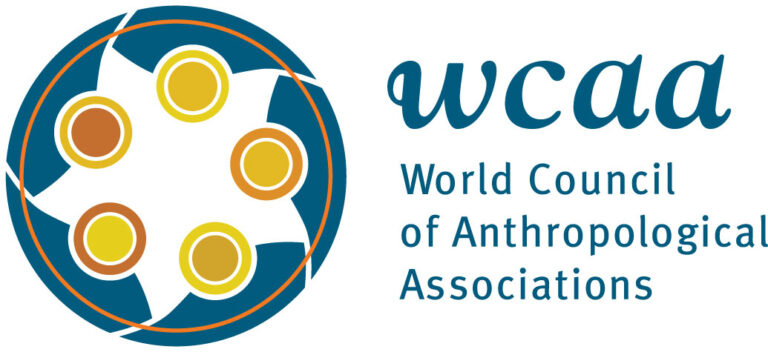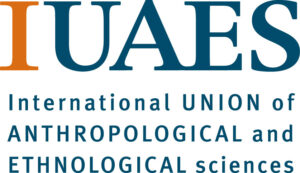Questions for Journal Editors for the Tenth Anniversary of Deja Lu
Interview with Chip Colwell, Editor-in-chief of Sapiens, online publication of the Wenner-Gren Foundation for Anthropological Research
Interviewed by Gordon Mathews
19 Oct. 2021
Gordon Mathews: All the interviews I’ve done so far have been with academic journals. Sapiens is different. What is Sapiens?
Chip Colwell: Sapiens is an online free magazine that helps translate anthropological research, thinking, and discoveries—anthropology in all four fields—for a broad general public. We like to think that we can take the best of anthropology, what’s going on in the ivory tower, and bring it to the world, for someone who’s your neighbor, your dentist, or your mailperson—someone who could read an article and then see themselves differently through the lens of anthropology. We are the popular magazine of the Wenner-Gren Foundation, which is a granting organization based in the US, but dedicated to supporting anthropology worldwide. Sapiens was founded in 2015 and we’ve grown steadily through the years; we now publish about 150 articles a year and we receive about 4 to 5 million readers a year. We also have a podcast, which is another avenue to share anthropology in a different form of storytelling. Our day-to-day work is really finding the most interesting, exciting anthropology that’s out there and then working directly with anthropologists to help craft articles, essays, or op-eds that bring their research to the general public. A lot of anthropologists don’t have training in popular writing, so part of our work is helping anthropologists understand how to tell a story in a different kind of voice, in a different kind of way, so that it can be compelling for broad international audiences.
GM: Do you have many anthropologists seeking to publish with you, or do you seek out writers?
CC: Some months it feels like we’re drowning in submissions and other months it feels like we’re scrambling to try to pull together some pieces. We use volunteered articles, and we go out and seek anthropologists doing interesting work, often looking for them in conferences or those who have published new articles or books; or maybe they’ve been quoted in the news. We’re always on the prowl for anthropologists doing important work.
GM: You yourself have a PhD in anthropology and are a trained archaeologist.
CC: Yeah, I like to say that I can see it from both sides. I can see from the perspective of the insider with academic training—I’ve published a lot of academic work and have held posts with major professional organizations, and so I have that understanding of how the discipline works and how people are trained to think as anthropologists. But I’ve also spent more than a decade now in trying to communicate effectively with the public. I’ve created my own video series. I’ve done a lot of public speaking and received training in that. And I’ve gone through the process of writing a trade press book, where you have to get an agent—a very different kind of process that most academics are unaware of. And I’ve written a lot for public audiences, in the form of essays and op-eds. Through that process I’ve learned a lot about the hard work that it takes to be a public communicator.
GM: Why did you take the path you took, from being an academic anthropologist to becoming a popular communicator?
CC: Well, a lot of it was just not being able to get a job in academia! There’s the simple math of necessity. But beyond that, when I was transitioning from undergraduate to graduate school, I had a real interest in trying to form bridges between anthropology and Native American communities that are often the subject of anthropological research, but often aren’t participants in the process. In working with Native American tribes in the U.S. Southwest, I saw how little of the discipline actually gets to the communities who are the focus of research. I think that was really the seed of my interest in public education: seeing how isolated communities can be from the very research that’s done in them. When I couldn’t get an academic job, I was very lucky to get a job as a curator at the Denver Museum of Nature & Science in Colorado. The museum had two requirements of its curators. First, be a good scientist. And second, be a good science communicator. So, my job was to be a researcher, but then also to find creative ways to communicate that research to different publics.
GM: How do you evaluate potential articles for Sapiens?
CC: Whether we’re soliciting a piece or someone is volunteering one, we go through something called the “pitch” process: this would be pretty unfamiliar to a lot of academics. For most newspapers and magazines in North America, Europe and beyond, you are required to propose your idea through the “pitch” to the editors. We use several different criteria to evaluate the pitches. First, the pitch has to demonstrate that the person has expertise in their particular area. Second, we look for a hook: why a reader would want to read about this research right now. Third, we ask if the person is convincing and compelling. If it’s an opinion piece, do they have a clear argument that’s going to persuade readers? If they’re writing a narrative essay, do they have an element of storytelling to give the flavor of place and people? These are really the three lenses that we’re using to evaluate whether or not to accept a piece.
GM: Are most of your authors professional anthropologists?
CC: Up to this point we’ve had about 75% of our content being written directly by anthropologists, mostly advanced graduate students and beyond. We do have journalists write for us occasionally, and they usually try to write in areas that are controversial. But we very much are moving towards anthropologists writing almost all of our pieces. What we’ve seen after five years is that although journalism can cover these topics, what we can uniquely provide to the media landscape is the voice of anthropologists themselves.
GM: What about anthropologists who can’t write well? Is that a problem?
CC: There’s a phrase that the current president of the Wenner-Gren Foundation, Danilyn Rutherford, uses to describe a lot of anthropological writing: she calls it “beautiful abstractions.” To those in the discipline it is persuasive and compelling, but to those outside the discipline it’s very difficult to comprehend. We anthropologists are not trained to write in a way that’s comprehensible to the public. As anthropologists we have incredible experiences, going to corners of the world to explore communities or deep layers of time that most people have no access to. So, what we at Sapiens try to do is bring out those positive things that anthropologist do and try to draw those out into narrative formats or opinion pieces that are much more aligned with how the public consumes information. Once pieces are accepted, they go through a really rigorous editing process, and all of our pieces are fact checked. We hope that the writer, no matter where they are in their career, can understand that our editorial team is on their side; we want their piece to be successful, we want it to be read
GM: Your audience here at Deja Lu is worldwide readers of academic journals, and some of these people may mistrust the hegemony of English. In Sapiens is English your only language?
CC: We currently are exploring how it might be possible to write first in a non-English language and then publish in Sapiens. We now translate many of our pieces into many different languages, and so we’ve published in Italian, Portuguese, Spanish, French, and so on. We also in some cases have included audio readings of pieces in Indigenous languages. We’re really interested in experimenting and finding ways to break out of the English-language hegemony. We’re mainly limited, like so many magazines and outlets, by resources; we can only do so much with what we have.
GM: How many staff do you have working for you at Sapiens?
CC: We have currently a staff of eight, a mix of people doing everything from 10 hours a week, up to full time. We currently only have two full-time employees, but it is amazing to have this. Many journals are driven by the work ethic and the love that editors have for their publications—I’ve been an academic journal editor myself, so I understand the kind of dedication that it takes, and I deeply respect it; I don’t take for granted the kinds of resources that we have at Sapiens. Because we have those resources, I see us as an outlet serving the field as a whole. I see us, hopefully, as a kind of voice for the discipline around the world. About half of the readers of Sapiens come from outside the United States. We’ve been read from every single country in the world, including even one reader in North Korea! Because we have stable institutional support from the Wenner-Gren Foundation, Sapiens can be a kind of long-term vision of change for the discipline. And that vision is one of helping anthropology as a whole, translating its ideas about the world to have an impact on the world. There are so many crises that the world faces right now, environmental and human, and anthropology is not having the impact we could have. We’re really trying to understand what it takes to shift the discipline not over years but even over decades.
GM: What would you say to anthropologists who say, “I don’t care if ordinary people don’t understand what I’m writing. I’m writing for my fellow anthropologists.”
CC: I don’t see it as an either/or. Even though I continue to write for a broader public and do public talks and podcasting, I’m also an academic and I continue to publish in academic venues. Academic publication has a real value: we need a kind of coded language to be able to speak to each other, to move ideas forward. However, I don’t think that’s enough: a discipline that has no connection to the real world, that’s totally divorced from communities and their concerns, is not long for this world. I think it’s in our disciplinary DNA to connect our work to the public.
GM: What are the biggest problems you face as journal editor?
CC: The problems I face most immediately are how to work together as a team. We have a staff of eight people spread around the world in different time zones and so the issue is how you move everyone together towards a shared goal. In a broader sense, the biggest challenge is that anthropologists still just aren’t being trained to write for the general public, so for so many of our writers it’s learning to do this from scratch. I would love to see, indeed my dream, is a day where anthropologists come to us ready with many of the necessary skills in the craft of writing for the public.
GM: Many of the journal editors in Deja Lu complain about Anglo-American hegemony in anthropology. How do you feel about that?
CC: I can totally understand it. I understand the way North American and European dialogue can dominate so much of world anthropology. And to that, I think we just have to do better. Certainly the Wenner-Gren Foundation is looking really seriously at how it has too often failed to truly support anthropologists all around the world, no matter what tradition they’re working in. Sapiens too has to do better. We are doing our best given the time and resources it takes, but it’s also something we can’t change immediately, we just can’t turn 180 degrees and change a century-plus of North American dominance in colonialist kinds of practices—that has to be changed on a scale of decades.
GM: You are telling your audience of global anthropologists, “I do understand this, but just be patient.”
CC: When Sapiens started, in our first year, about 90 some percent of our readers were in North America, and now it’s about 50 percent. We are translating articles in different languages, and we are starting partnerships with anthropology organizations around the world. Just this last year we created a partnership with the anthropology association in the Philippines, an archaeology association in South Africa, and an archaeology and physical anthropology association based in Kenya. It’s through these kinds of partnerships that we can learn and grow and ultimately do better.



